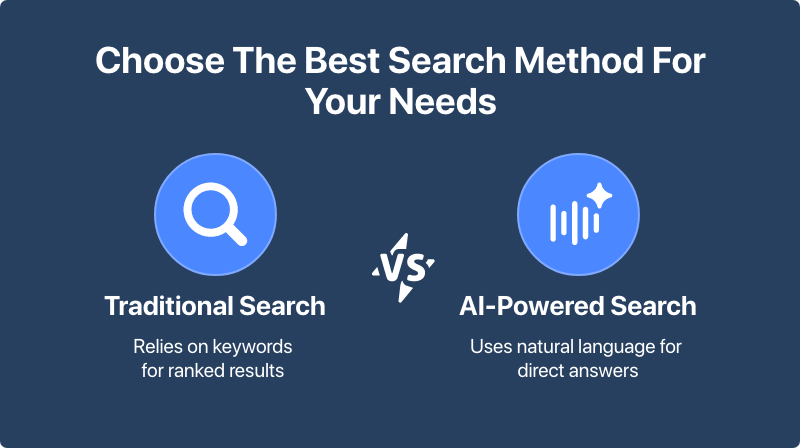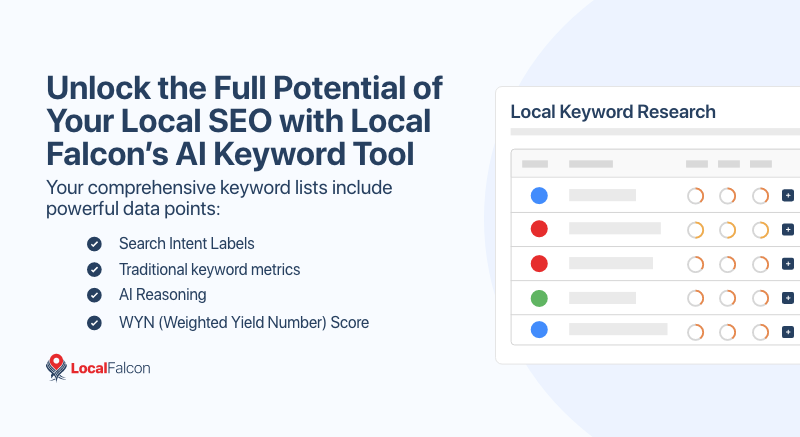Artificial intelligence is changing the way people search for information online. Instead of typing a few words into a search box, many are now turning to AI-powered search tools and chat interfaces, asking complete questions in a conversational way and getting direct, context-aware answers.
For local businesses, this means there's a new type of search term to consider for SEO: AI keywords.

AI Keywords Vs Traditional Search Keywords
For years, keywords have been mainly classified as short-tail and long-tail terms. Short-tail keywords are broad and high-volume, like "pizza delivery," while long-tail keywords are more specific, such as "best gluten-free pizza delivery downtown Chicago." These categorizations still matter for traditional SEO, but the rise of AI search adds a new distinction: traditional search keywords vs AI search keywords.
Traditional search keywords are ideal for ranking in Google Search, Bing, and other classic search engines. AI search keywords, on the other hand, are those that trigger mentions in conversational AI interfaces, where users ask complete questions or phrase their needs naturally.
In today's search ecosystem, targeting both traditional and AI search keywords is important if you want to reach people in every environment they potentially use to find businesses.

How Does AI Search Differ From Traditional Keyword-Based Searches?
When someone types a keyword into Google, they often use shorthand or a condensed phrase. For example, a person might search for "coffee shop near me." Since the early days of search, we've been taught that we just need to give search engines a couple of words related to what we want to know, and the algorithms will do the rest.
With AI-powered search, the interaction is more conversational. A user might type or say, "What's the best coffee shop near me that has outdoor seating and is open right now?" People are relearning what it means to search, discovering that if they speak to AI tools using natural language, they can get a more comprehensive, context-aware answer in just one query.
AI systems are designed to parse context and deliver a single, direct answer instead of a list of ranked results. This makes AI keywords longer, more specific, and far closer to how a person would speak rather than type.
How Important Are AI Keywords for Local SEO?
Because they're so specific, AI keywords may not register high search volumes in traditional keyword research tools, but that doesn't mean people aren't using them to discover local businesses. As more users interact with AI assistants, chatbots, and AI-driven search engines, these terms will become more common in customer discovery paths.
For now, AI search still accounts for a small percentage of overall local search traffic compared to the most dominant sources: Google Search and Google Maps. However, usage is steadily growing, and businesses that start targeting AI keywords today will be ahead of competitors who wait.
Capturing AI search visibility now helps future-proof your local SEO strategy, ensuring you have a meaningful Share of AI Voice (SAIV) in every market you serve. The sooner you integrate AI keywords into your optimization plan, the stronger your position will be when AI search becomes a more standard part of the customer journey.
How Can You Find AI Keywords To Target and Increase AI Visibility?
Finding AI keywords is not the same as finding traditional search terms. Traditional keyword research tools often entirely ignore the types of longer, more conversational search phrases that people use to prompt AI tools. This is where Local Falcon's AI-powered Local Keyword Tool can help.
With this AI keyword tool, you can generate two hyperlocal keyword lists based on your business location and a seed term:
- Traditional search keywords: typically a mix of short-tail and long-tail phrases with a maximum of five to six words, mostly industry- or service-related terms with geo-modifiers.
- AI search keywords: longer, more conversational queries that reflect how people speak to AI search tools in your area.
Each keyword in these lists includes:
- Search intent labels: commercial, informational, transactional, or navigational.
- Traditional keyword metrics: volume and difficulty scores.
- AI reasoning: advanced-reasoning context explaining why the keyword is worth targeting.
- WYN (Weighted Yield Number) score: a Local Falcon-exclusive metric estimating the keyword's potential value for your business in traditional search or AI search.
You can build keyword lists with as many terms as you like, experiment with different seed terms, and keep refining your list. Once you have your keywords, you can run a Local Falcon rank tracking scan to see where you currently appear, analyze competitors, and identify opportunities for improvement across both search types.
This process allows you to target the right mix of traditional and AI keywords, making sure you stay visible in traditional local search results and AI-generated answers alike.

Conclusion
With the introduction of Large Language Models (LLMs), the search industry is at a new frontier, and AI keywords are becoming an important part of local SEO.
While traditional search keywords remain critical for visibility, especially in Google Search and Google Maps, but also Bing, Apple Maps, and other local search platforms, AI keywords open the door to discovery through conversational AI tools and emerging search platforms and features.
Using Local Falcon's AI-powered Local Keyword Tool lets you identify, track, and target both keyword types with precision. Doing so now helps ensure that your business stays competitive, maintains strong visibility wherever your audience is searching, and is ready for the next iteration of local search.


